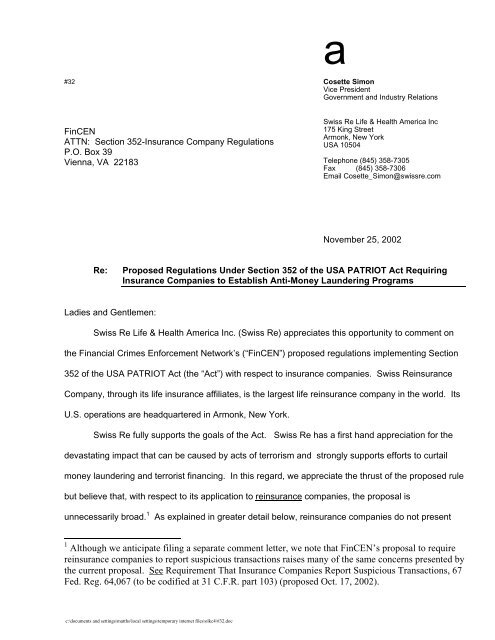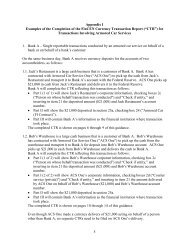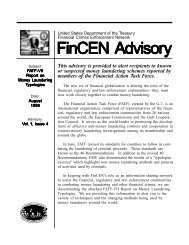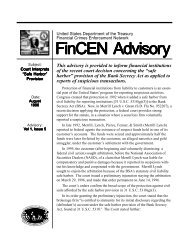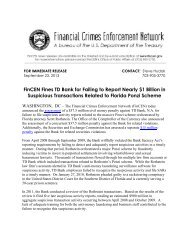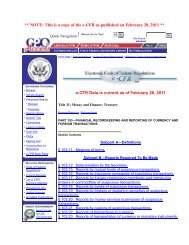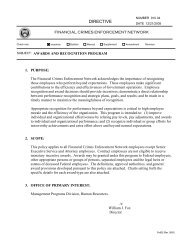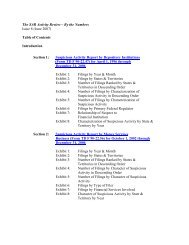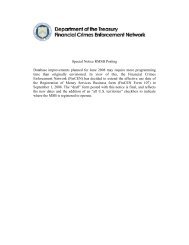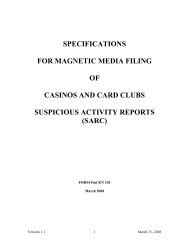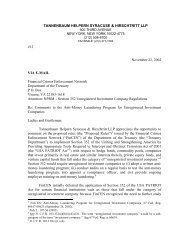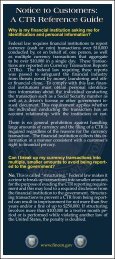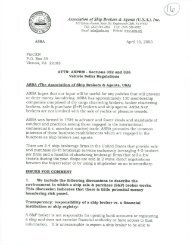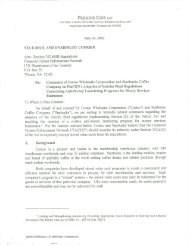M&G CI Template - FinCEN
M&G CI Template - FinCEN
M&G CI Template - FinCEN
You also want an ePaper? Increase the reach of your titles
YUMPU automatically turns print PDFs into web optimized ePapers that Google loves.
#32<br />
<strong>FinCEN</strong><br />
ATTN: Section 352-Insurance Company Regulations<br />
P.O. Box 39<br />
Vienna, VA 22183<br />
a<br />
Cosette Simon<br />
Vice President<br />
Government and Industry Relations<br />
Swiss Re Life & Health America Inc<br />
175 King Street<br />
Armonk, New York<br />
USA 10504<br />
Telephone (845) 358-7305<br />
Fax (845) 358-7306<br />
Email Cosette_Simon@swissre.com<br />
November 25, 2002<br />
Re: Proposed Regulations Under Section 352 of the USA PATRIOT Act Requiring<br />
Insurance Companies to Establish Anti-Money Laundering Programs<br />
Ladies and Gentlemen:<br />
Swiss Re Life & Health America Inc. (Swiss Re) appreciates this opportunity to comment on<br />
the Financial Crimes Enforcement Network’s (“<strong>FinCEN</strong>”) proposed regulations implementing Section<br />
352 of the USA PATRIOT Act (the “Act”) with respect to insurance companies. Swiss Reinsurance<br />
Company, through its life insurance affiliates, is the largest life reinsurance company in the world. Its<br />
U.S. operations are headquartered in Armonk, New York.<br />
Swiss Re fully supports the goals of the Act. Swiss Re has a first hand appreciation for the<br />
devastating impact that can be caused by acts of terrorism and strongly supports efforts to curtail<br />
money laundering and terrorist financing. In this regard, we appreciate the thrust of the proposed rule<br />
but believe that, with respect to its application to reinsurance companies, the proposal is<br />
unnecessarily broad. 1 As explained in greater detail below, reinsurance companies do not present<br />
1 Although we anticipate filing a separate comment letter, we note that <strong>FinCEN</strong>’s proposal to require<br />
reinsurance companies to report suspicious transactions raises many of the same concerns presented by<br />
the current proposal. See Requirement That Insurance Companies Report Suspicious Transactions, 67<br />
Fed. Reg. 64,067 (to be codified at 31 C.F.R. part 103) (proposed Oct. 17, 2002).<br />
c:\documents and settings\matths\local settings\temporary internet files\olkc4\#32.doc
the type of money laundering risks that the rule is intended to address. In addition, reinsurance<br />
companies are not in a position to address the types of money laundering risks identified in the<br />
preamble. Given the extremely low likelihood that reinsurance products could be used to facilitate<br />
money laundering, Swiss Re believes that the requirements of the final rule should not be imposed on<br />
reinsurance companies.<br />
1.1 Reinsurance Products Pose Little Risk of Money Laundering Abuse.<br />
The preamble to the proposed rule recognizes that all insurance products do not present the<br />
same level of risk for being used as vehicles for money laundering and terrorism financing.<br />
<strong>FinCEN</strong> believes that the most significant money laundering and terrorist financing<br />
risks in the insurance industry are found in life insurance and annuity products because<br />
such products allow a customer to place large amounts of funds into the financial<br />
system and seamlessly transfer such funds to disguise their true origin. 2<br />
The preamble goes on to explain that, “the identified instances of money laundering through<br />
insurance companies generally have been confined to life insurance products.” 3 Accordingly, <strong>FinCEN</strong><br />
explained that the proposed rule was designed to “capture[] only those insurance products with<br />
investment features, and insurance products possessing the ability to store value and to transfer that<br />
value to another person.” 4 This rationale justified the exclusion of property and casualty, health and<br />
title insurers.<br />
Yet the proposed definition of “insurance company” includes entities which reinsure life,<br />
annuity and investment products. The inclusion of reinsurance companies within the scope of the<br />
proposed rule is inconsistent with <strong>FinCEN</strong>’s stated intent. Moreover, reinsurance products do not<br />
possess investment features “with the ability to store value to transfer that value to another person”<br />
2 Anti-Money Laundering Programs for Insurance Companies, 67 Fed. Reg. 60,625, 60,626 (2002) (to<br />
be codified at 31 C.F.R. pt. 103) (proposed Sept. 26, 2002).<br />
3 Id. at 60,626-27.<br />
c:\documents and settings\matths\local settings\temporary internet files\olkc4\#32.doc<br />
2<br />
z
identified by <strong>FinCEN</strong> as creating the greatest money laundering risk among insurance products. No<br />
indication is given that instances of money laundering have been accomplished through reinsurance<br />
companies.<br />
Reinsurance is the process by which a reinsurance company, such as Swiss Re, takes on all<br />
or part of a direct insurer’s risk in exchange for the payment of a premium. The liability of the<br />
reinsurance company is solely to the direct insurer – not to the underlying insured party. In the case<br />
of annuity contracts, permanent life policies with cash surrender values and term life policies,<br />
reinsurers generally have no contact with the underlying insured party or role in setting the terms of<br />
the underlying contracts. Because reinsurers are not involved in setting the terms of the insurance<br />
contracts they reinsure, the availability of reinsurance to a pool of annuity or permanent life contracts<br />
has no bearing on whether an insured party would exercise options under those contracts (at<br />
substantial financial penalty) to launder money or to further a scheme of terrorist financing. The<br />
preamble’s absence of an explanation for the connection of reinsurance to money laundering<br />
suggests that the proposed imposition of anti-money laundering obligations on reinsurers lacks a<br />
reasonable basis. Accordingly, the definition of “insurance company” should be amended to make<br />
clear that it does not include reinsurers.<br />
1.2 Reinsurance Companies Have No Direct Customer Contact.<br />
<strong>FinCEN</strong> emphasizes the importance of customer information in assessing the money<br />
laundering risks associated with a particular insurance company. The preamble to the proposed rule<br />
provides a number of customer-related factors that should affect an insurance company’s money<br />
4 Id. at 60,626.<br />
c:\documents and settings\matths\local settings\temporary internet files\olkc4\#32.doc<br />
3<br />
z
laundering risk profile. 5 None of these factors is applicable to reinsurance companies because<br />
reinsurers have little or no direct customer contact. As noted above, a reinsurer’s “customers” are<br />
direct insurance companies – not individuals. Furthermore, life reinsurance treaties are typically<br />
written on a portfolio basis – not on the basis of individual contracts. Although the reinsurer may<br />
receive copies of original documentation in connection with its reinsurance of a particular portfolio, it<br />
does not have contact with the underlying insured.<br />
<strong>FinCEN</strong>’s inclusion of reinsurance companies within the scope of the proposed rule is<br />
inconsistent with the approach taken by <strong>FinCEN</strong> in imposing the same provisions of the Act to<br />
unregistered investment companies. 6 That proposal excludes from its scope “all types of entities<br />
whose interests are sold only on a secondary market….” 7 Explaining this exclusion, <strong>FinCEN</strong> notes<br />
that “[t]hese entities generally do not have an account relationship or otherwise deal directly with<br />
investors and therefore are not in a position to monitor for money laundering.” 8 In their relationship<br />
with direct writing companies, reinsurance companies are generally analogous to the secondary<br />
market participants excluded from <strong>FinCEN</strong>’s investment company proposal. Like the excluded<br />
investment companies, reinsurers do not “have an account relationship with or otherwise deal directly<br />
with” the underlying insured. This lack of customer contact places reinsurance companies in a poor<br />
position to monitor for money laundering and terrorism financing risks. With regard to anti-money<br />
laundering requirements, reinsurance companies should be accorded treatment equivalent to that<br />
proposed for unregistered investment companies whose shares are traded on secondary markets.<br />
5 These factors include: 1) whether the company permits customers to use cash or cash equivalents to<br />
purchase an insurance product; 2) whether the company permits customers to purchase an insurance<br />
product with a single premium or lump-sum payment; and 3) whether the company permits customers<br />
to take out a loan against the value of an insurance product. See id. at 60,628.<br />
6 See Anti-Money Laundering Programs for Unregistered Investment Companies, 67 Fed. Reg. 60,617<br />
(2002) (to be codified at 31 C.F.R. pt. 103) (proposed Sept. 26, 2002).<br />
7 Id. at 60,619 n.20.<br />
8 Id.<br />
c:\documents and settings\matths\local settings\temporary internet files\olkc4\#32.doc<br />
4<br />
z
1.3 The Rule’s Coverage of Direct Insurers Provides Adequate Protections Against the<br />
Use of Insurance Products as Vehicles for Money Laundering.<br />
Excluding reinsurance companies from the scope of the rule would have little impact on<br />
preventing money laundering. All funds flowing to a reinsurance company necessarily flow through a<br />
direct insurer, who would be required by the rule to maintain anti-money laundering programs.<br />
Requiring reinsurance companies to oversee direct insurers’ anti-money laundering programs in<br />
effect requires reinsurance companies to assume a regulatory role over direct companies. It is<br />
inappropriate to impose such a regulatory burden on reinsurers – particularly given the nature of<br />
reinsurance products and the reinsurer’s lack of customer contact.<br />
Under the proposal, insurance companies are obligated to assess the risks associated with,<br />
among other things, their distribution channels. In this regard, the proposal makes clear that an<br />
insurance company must incorporate policies and procedures that address the role of a company’s<br />
agents and brokers in its anti-money laundering program. However, the relationship of reinsurer to<br />
direct insurer is not equivalent to that of direct insurer to broker or agent. Direct insurers are not<br />
elements of a reinsurance company’s distribution channels, but rather the purchasers of products<br />
sold by reinsurers. Reinsurance companies and direct insurers do not have the type of agency<br />
relationship that could be a basis for holding reinsurers responsible for the anti-money laundering<br />
compliance of the direct insurers whose policies they reinsure.<br />
1.4 Conclusion<br />
If reinsurers are required to comply with this proposal, they must adopt anti-money laundering<br />
programs that are “reasonably designed” to address their money laundering risks. We believe that<br />
reinsurers are unlikely to confront or have knowledge of money laundering activities. The proposal<br />
nevertheless mandates that all reinsurers formulate written policies and procedures, periodically<br />
c:\documents and settings\matths\local settings\temporary internet files\olkc4\#32.doc<br />
5<br />
z
update such policies and procedures, designate a compliance officer, provide on-going education and<br />
training to their employees, and arrange for independent testing of their anti-money laundering<br />
program. Reinsurance companies, should not be subjected to such burdensome requirements in the<br />
absence of a strong correlation between reinsurance and money laundering or terrorist financing.<br />
Lacking such a correlation, we respectfully urge that <strong>FinCEN</strong> amend the scope of the proposed rule to<br />
exclude reinsurance companies.<br />
* * *<br />
Please feel free to contact the undersigned if you wish to discuss these comments further.<br />
Respectfully submitted,<br />
Cosette R. Simon<br />
c:\documents and settings\matths\local settings\temporary internet files\olkc4\#32.doc<br />
6<br />
z


